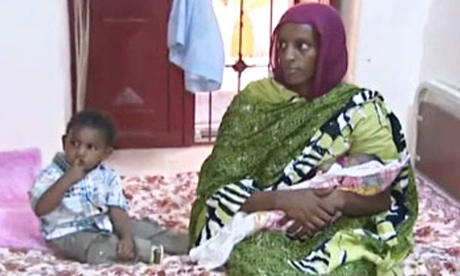
In mid-May, a Khartoum court sentenced Mariam Yahya Ibrahim to 100 lashes and death by hanging for the crimes of adultery and “apostasy.” Ibrahim, who was raised as a Christian, was accused of adultery after marrying a Christian man and becoming pregnant. The charge of apostasy was added later, after Ibrahim insisted that she had always been a Christian and refused to recant her faith. Under Sudanese law, a person’s religion is considered to be passed down through the father, and since Ibrahim’s father was Muslim, she was also considered Muslim under the law despite her Christian upbringing. The law also refuses to recognize any marriage between a Muslim woman and a non-Muslim man, and criminalizes sexual relations outside an official marriage. After being arrested during the eighth month of her pregnancy, Ibrahim gave birth in a prison clinic while shackled to the floor. The judge who handed down her sentence ruled that she would have two years to nurse her baby before the execution would be carried out.
Ibrahim married Dr. Daniel Wani, her current husband, in 2012 in a Christian church, and aside from the newborn, the couple have a 20-month old son who is currently living in prison with his mother. Since the couple’s marriage is not valid under the law, Dr. Wani has been denied custody of the children and cannot remove them from the prison. He was charged with adultery alongside his wife, and their lawyers are currently seeking to appeal all charges laid against the couple.
When the sentence was first passed down, international outrage as well as local activism put pressure on the Sudanese government to revoke the harsh sentence. High profile human rights activists, as well as leaders from around the world, have jointly denounced the sentence as “barbaric,” with British prime minister David Cameron expressing that Ibrahim’s treatment had “no place in today’s world.” On May 31st, a Sudanese foreign ministry official announced to the BBC that authorities were working towards Ibrahim’s release, though her lawyer, Ali Elshareef Mohammed, expressed doubts that the statement would have any real impact on his client’s situation. According to the law, the government has no ability to overturn a court ruling, and if Ibrahim were in fact to be released, it is more likely that the court of appeals would have put out a statement about it before the ministry of foreign affairs did.
Though the statement itself does not indicate that Ibrahim may be shown leniency, it is nonetheless a sign that pressure from the international community carries some weight with the Sudanese government. Despite the foreign affairs ministry’s attempt to placate international human rights advocates, it seems that Ibrahim’s only real chance for release lies with the appeal submitted after her conviction. Cases like Ibrahim’s are not unheard of in Sudan, though the last execution of an adulterer was in 1985, and none have been executed for the “crime” since Sudan changed its criminal code in 1991. Perhaps if the international community ignores the Sudanese foreign ministry’s attempts to save face and continues to pressure for Ibrahim’s release, the mother of two may soon enjoy a speedy and successful appeal.




